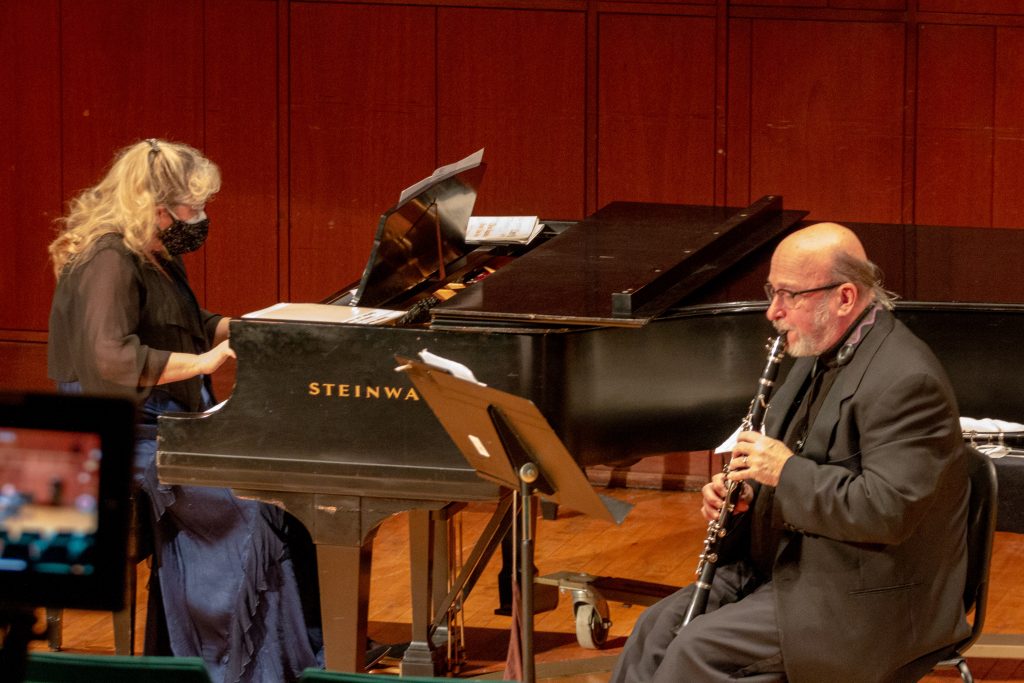Two Binghamton University music faculty returned to the recital hall this past Friday after a year of cancellations.
Timothy Perry, director of the BU Symphony and Chamber Orchestras and clarinetist, and Pej Reitz, accompanist, took to the Jean Casadesus Recital Hall in the Anderson Center on Feb. 18 to present a program entitled “Musica Australis.” This latest recital comes after four fully prepared recitals the duo had planned over the past year were canceled due to COVID-19.
Perry explained how the planning for this recital began with an acceptance into a Syracuse music recital series.
“This one was something we wanted to do for a set of recitals that take place in Syracuse throughout the year,” Perry said. “It’s a chamber of music series, and it takes place on Wednesday [at noon] in a number of the outstanding churches that they have in Syracuse. So we applied for the series and they accepted us, so we decided that we would do something with more of an international flavor.”
From their international aspirations, the duo formed the idea of “music of the south,” or music from the Southern Hemisphere. Perry detailed the specific tenets of their mission and the search it entailed.
“Places that are south of the kind of industrialized center of [European] countries that always form the basis of our repertoire,” Perry said. “That is England, Germany, France and to some extent Italy, and you know we don’t get into large portions of the world where there is music happening, sometimes extraordinarily good music. So I started looking into places where I haven’t played anything, and the ones that came up were New Zealand, Australia, Vietnam, the Indian subcontinent … we did come up with a number of countries that kind of made a single direction going far east to west.”
One of the most notable portions of the program was the selections from India. This portion featured the works of John Mayer, the first person of color to be hired by the London Philharmonic Orchestra, and included “skeleton ragas,” orchestrations based on classical Indian music rules. Perry described the style featured in these arrangements.
“Now, [Mayer] wrote three pieces for clarinet, two of which are unaccompanied and are based on the traditional ragas of India,” Perry said. “The Indian classical music is about as complicated and complex as Western classical music, but it is just based on different principles. So if you listen to a piece of Indian music it is all about a single-line melody and the way in which that is changed and manipulated and made more expressive, sometimes by changing the notes of the scale, so it is very complicated in a rhythmic sense.”
Another portion of note from the program was Spain’s contribution, centered on “Seis Estudios de Concierto’’ by Julián Menéndez. Reitz discovered this piece during a master class and brought it to Perry’s attention soon after. Perry discussed the process of getting the piece and its history.
“So [Reitz] went to the one big music store they have in Madrid and managed to find a copy, and brought it back,” Perry said. “We play one of the six pieces in the set. They were used as audition pieces. Like if you wanted to get a job in a professional band of Madrid, the Madrid Municipal [Symphonic] Band, you would have to play this piece as an audition work, and you would have to do a particular reading of it if you were trying out as an actor. It is just stunning music, absolutely beautiful and hard as heck.”
Perry said the nontraditional outlook brought new musical experiences for Perry and Reitz.
“Most of the pieces we are doing, we have never done before,” Perry said. “I think six of the nine pieces are new to us, so in that way it has been a success because it has brought us a lot of new contacts with music from other countries and composers that we have never worked with. And we have been able to contact some of them, and send emails back and forth asking them about their pieces.”
Perry also discussed the new musical experiences that keep audiences coming back.
“I think they come because they want to get something new,” Perry said. “You are always instructed by hearing a new piece of music, and I think we’ve come to love these pieces quite dearly.”



